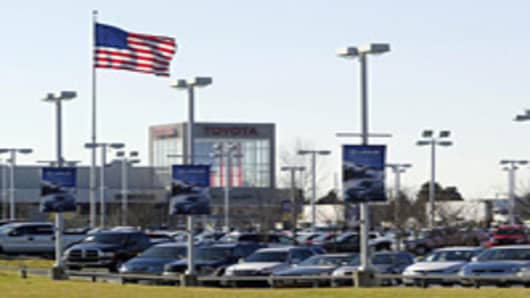An unexpected rise in January retail sales, reported by the government Wednesday, fired up hopes the U.S. economy might skirt recession despite the pressure on consumers from a weakening housing market.
The Commerce Department said sales at U.S. retailers rose 0.3 percent in January to a seasonally adjusted $382.91 billion on higher sales of new cars, gasoline and clothing.
That was sharply contrary to Wall Street analysts' forecasts for a 0.2 percent drop and helped drive stock prices higher in early trading while government bond prices fell.
"The report strengthens the case of those who think we'll skirt a recession," said Jim Awad, chairman of W.P. Stewart in New York, but he cautioned the optimism might be short-lived.
"People will say this is subject to revision and it's inconsistent with other incoming data indicating softness and weakness in the economy," Awad said.
The dollar's value strengthened against other key currencies.
According to Commerce, the value of new-car sales rose 0.6 percent in January -- a figure that some private-sector analysts regarded as suspect and said might be revised in coming months.
"This is completely at odds with auto industry data, which reported a 5.6 percent drop in overall unit sales in January to 15.3 million" cars and trucks, said Brian Bethune, an economist with Global Insight in Lexington, Mass.
Excluding autos, Commerce said January sales still rose 0.3 percent, reversing a 0.3 percent fall in December. Wall Street analysts were expecting a 0.2 percent gain in sales excluding autos.
"The data is clearly a surprise to the upside," said Omer Esiner, a market analyst with Ruesch International in Washington, D.C. "In the near term, it does ease some recession concerns."
Despite the higher headline number for sales, there were declines in many categories, which implied consumer spending was being pinched. Furniture sales fell 0.5 percent in January, building material sales were down 1.7 percent and department store sales declined by 1.1 percent.
Many analysts think the slowing U.S. economy faces increasing risks of tumbling into recession and are closely watching for signs that consumers, who fuel 70 percent of national economic activity, will keep scaling back spending.
A later report from Commerce said December business inventories climbed by a higher-than-forecast 0.6 percent in December. Business sales dropped 0.5 percent in December, the biggest decrease in nearly a year.
President Bush was scheduled to sign into law a $152 billion fiscal stimulus package Wednesday that will provide tax rebates to 130 million Americans. The rebate mailing is expected to start in May and be completed during the summer, which should add some spending punch to the economy in the third quarter.
The retail sales report showed gasoline sales up 2 percent in January after being flat in December, but analysts said that likely reflected higher prices, not stronger demand.
Excluding gasoline, January retail sales rose 0.1 percent.
A separate report showed mortgage applications fell last week from highest in nearly four years as mortgage rates rose.
The Mortgage Bankers Association said its home loan application index fell 2.1 percent last week as both home purchase and refinance applications slipped.
Applications for home refinancing had been particularly strong over the past month as average 30-year mortgage rates slumped as low as 5.49 percent in mid-January. Last week however, rates rose by 0.11 percentage point to 5.72 percent.



